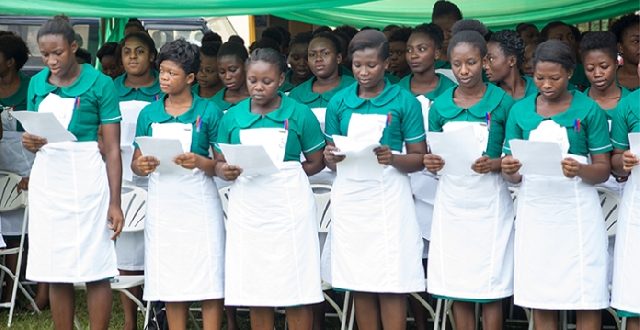Answering a question on radio on 28th May 2020, the General-Secretary of the Ghana Registered Nurses and Midwives Association stated thus. “We are not soldiers who take an oath to die for Ghana. We nurses do not swear to die for Ghana. We must therefore be given PPEs to protect ourselves as we work to save lives, and not die in the process!”
I sighed and said to myself, “point well made!” I cannot fault the General Secretary for making the point so strongly for his profession Nursing, and by implication all Health Practitioners to be adequately protected to do what they are trained for without endangering their lives.
Expendable: However, his statement hit a raw nerve as it appears to have restated implicitly the notion, and sometimes directly stated point that, soldiers are expendable because of the oath we swear to defend our country, even at the peril of our lives. This expectation remains unchanged even if like the nurses, we do not have our equivalent of PPEs of weapons and equipment. Indeed, some soldiers deployed to provide security during the COVID-19 lock down tested positive after the operation.
Roles: The basic role of the Ghana Armed Forces is to protect and defend the sovereignty and territorial integrity of Ghana by land, air and sea from external aggression. So, should the need arise, while the Army fights on land, the Navy will fight from sea and the Air Force from the air in a coordinated manner. To achieve that end, the State is constitutionally enjoined to equip and train the Ghana Armed Forces.
Support: War aside, a role which could be assigned the Armed Forces is to support the Ghana Police in the restoration and maintenance of law and order in Internal Security. This is done when the Police assesses a situation to be untenable and therefore formally invites the Military in.
So basically, while the Armed Forces’ mandate is for the external defence of Ghana’s sovereignty, the Ghana Police’s raison d’etre is for the Internal Security of Ghana.
Non-traditional Roles: Unfortunately, the Ghana Armed Forces has found itself playing some roles in Internal Security which should be the responsibility of the Police. I daresay that probably, there is a historical antecedent to this anomaly. The 1966 coup which overthrew Dr Nkrumah was conducted jointly by the Police and the Army with external support.
“Joint-ness”: Somehow, this “joint-ness” of 1966 has continued till today. Indeed, it has almost become routine for the State to launch the two services into “joint military-police” operations ab initio, without regard for the basic teaching of the Police moving in first.
This is not to say, the two services cannot be deployed jointly in emergency situations. However, where it has to be done, proper procedures must be followed.
Additionally, the Military is often misused among others, for the protection of state officials, a role which is that of the Police. The Police must be equipped and trained to perform the roles for which they exist, so the Armed Forces can concentrate on their core mandate. The two institutions have different roles and cultures which must not be blended.
Military: For the three week period between 15th March and 5th April 2020 that Greater Accra, Tema, Kasoa and Greater Kumasi were under lock down courtesy COVID-19, soldiers provided security with the Police. In spite of the unfortunate accusation of “military brutality” based sometimes on old video clips, there was a huge agitation for the soldiers to be brought back to handle what is fast becoming “traditional Ghanaian indiscipline” when the lock down was lifted.
Demands: Unfortunately, Ghanaians have grown to believe that, basic things involving discipline get done only when the military gets involved. Consequently, there have been interesting demands for the military to be brought in to help solve our self-inflicted problems of sanitation including curbing of open defecation.
The question is, what are the agencies paid by the State to ensure hygiene and sanitation doing? Why can we not enforce simple bye-laws in our local governance? For a country which prides itself with having excellent laws which others come to learn from, good laws that are not enforced are no laws.
Neighbours
An immediate observation one makes on driving out of Ghana into any of our neighbouring countries is their discipline. Motor-cycle (“okada”) riders dare not ride without helmets or go through red light! Confidently urinating indiscriminately outside is unheard of!
So, over sixty years after independence, why do we need soldiers to enforce discipline in basic sanitation? Why do we assist foreigners ruin our rivers with “galamsey” and expect to be chased by soldiers to do what is right? Where is the authority of our traditional rulers?
Conclusion
I consider the call for PPEs by the General Secretary of the Ghana Registered Nurses Association legitimate. However, soldiers who have taken the oath to defend Ghana at the peril of our lives must also not be sentenced to death prematurely by ‘Traditional Ghanaian indiscipline” before the need to defend Ghana arises.
If Ghanaians obey the preventive protocols, our inevitable contact with our compatriots in law enforcement will result in fewer contamination cases from COVID-19.
Fellow Ghanaians, WAKE UP!
Brig Gen Dan Frimpong (Rtd)
Former CEO, African Peace Support Trainers Association
Nairobi, Kenya
Council Chairman
Family Health University College
Teshie, Accra
dkfrimpong@yahoo.com
Source: Brig Gen Dan Frimpong (Rtd)
 Home Of Ghana News Ghana News, Entertainment And More
Home Of Ghana News Ghana News, Entertainment And More





